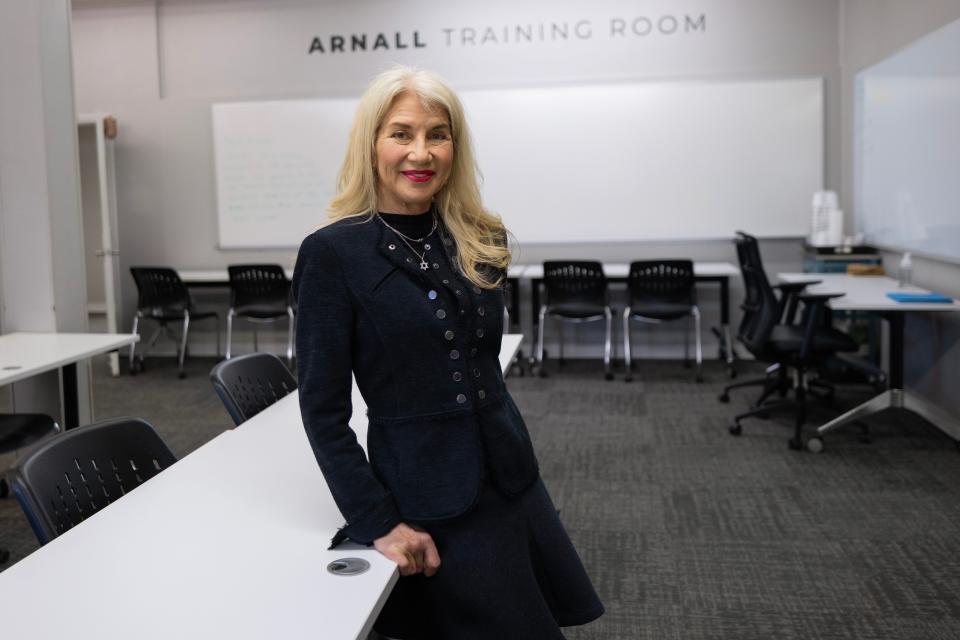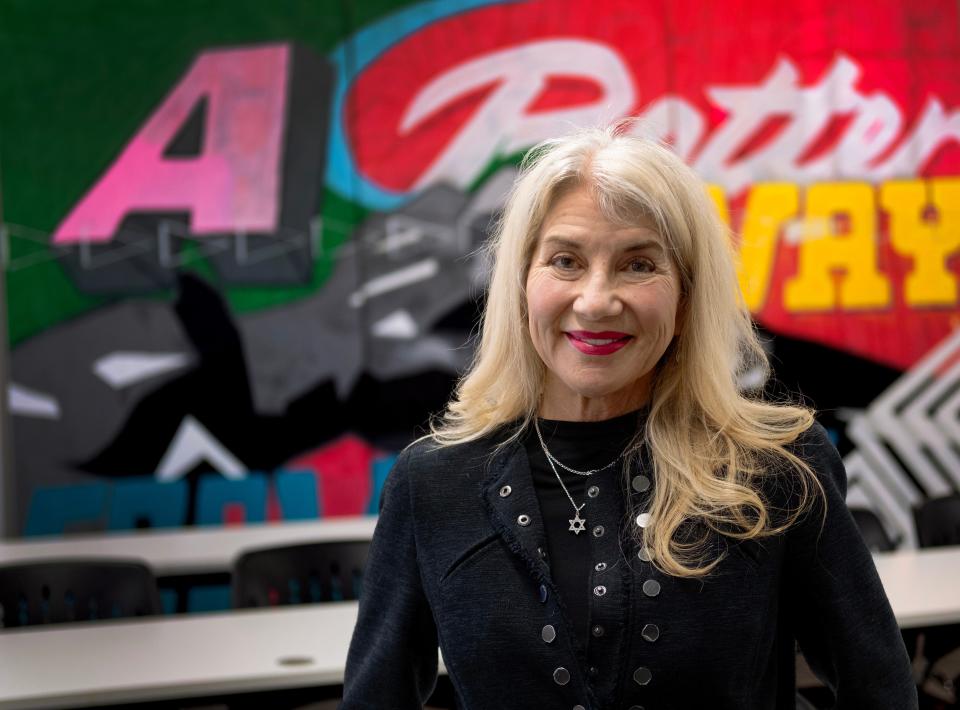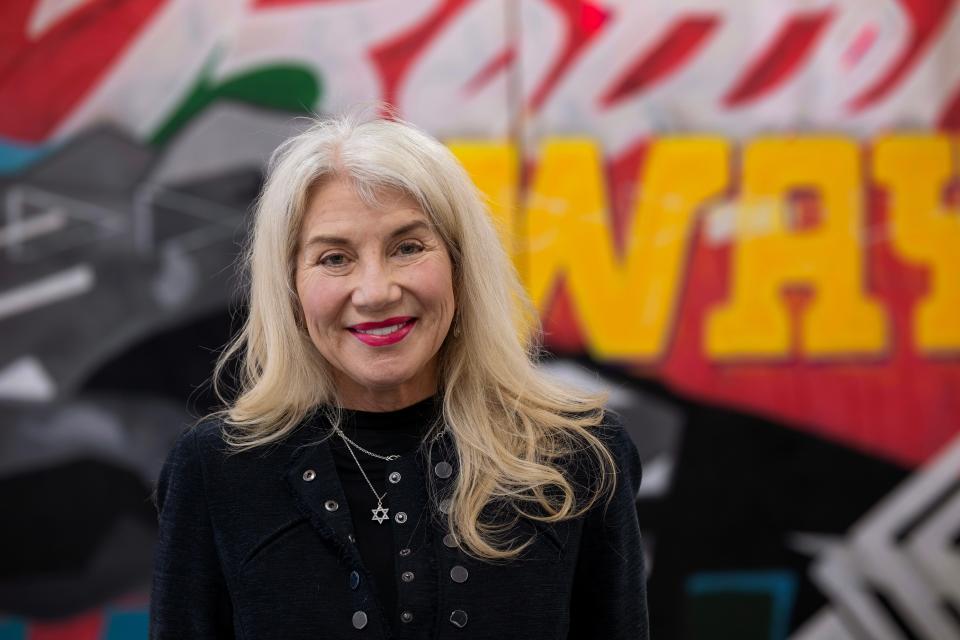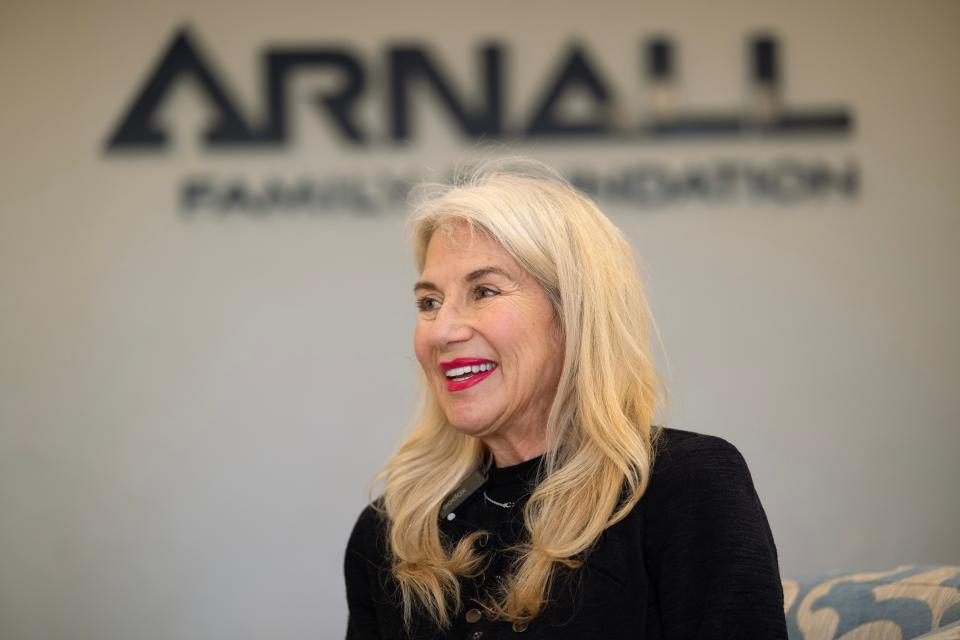Oklahoma's Women of the Year honoree says childhood mentors drove passion for helping others
Sue Ann Arnall is one of the nominees for USA TODAY’s Women of the Year program, a recognition of women who have made a significant impact in their communities and across the country. The program launched in 2022 as a continuation of Women of the Century, which commemorated the 100th anniversary of women gaining the right to vote. Meet this year’s honorees at womenoftheyear.usatoday.com.
By her own admission, Sue Ann Arnall is quiet and shy. And yet, at age 67, Arnall is playing a key role in transforming the lives of Oklahomans struggling with mental health, addiction, homelessness and ending cycles of crime and violence.
Arnall’s community service and philanthropy followed a career in corporate law and a life of wealth. It was a life, she says, that left her unsatisfied and at times even ashamed. She could never forget the example set by two close family friends, childhood mentors, who against all odds blazed a path of service in her hometown of Poteau.
Dr. John and Doris Montgomery moved from Colorado to Poteau, the heart of Oklahoma’s “Little Dixie,” in the early 1950s when the legacy of Jim Crow was still going strong. Doris Montgomery was an accomplished educator with a master's degree. John Montgomery was a veterinarian.
“They were the best educated people where I grew up,” Arnall said. “But they were Black. They couldn’t join the country club. They weren’t invited to others’ houses. Kids couldn’t go to their house.”
Such obstacles didn’t stop the couple from ministering to the entire town, from setting up an NAACP chapter, and serving a community that slowly, eventually came to embrace them. Their lives of service ultimately won them a place in the Oklahoma Hall of Fame.
“They took the high road,” Arnall said. “I watched them be leaders. I admired them so much.”
When Arnall graduated from law school in 1980, women accounted for just 10% of her class. She drew inspiration for overcoming her shyness by watching episodes of "L.A. Law." She enjoyed the job and got satisfaction from it.

She married, moved to Enid and entered the energy industry, which she saw was overwhelmingly dominated by men.
“I was trying to make it in a man’s world,” Arnall said. “A little woman with a low voice, a small voice. I was just trying to survive. I did the work.”
Following an example set in childhood
Board service with a couple of charities didn’t fulfill Arnall’s desire to follow the lead of her role models. She yearned to follow the lead set by the Montgomerys.
“Their whole lives were devoted to helping others,” Arnall said. “They helped me so much, I wanted to be like them. I lost my way when I got into business. But I kept thinking about it and I always felt guilty.”
In 2015, Arnall, having raised two daughters, started a new chapter and launched the Arnall Family Foundation. That same year she signed a “giving pledge” in response to a challenge by Warren Buffett, Bill Gates and Melinda French Gates to wealthy individuals and families to give the majority of their wealth to charitable causes.
“At an early age, my daughter, Jane, encouraged me to devote all of my resources to philanthropy and my dream of helping others,” Arnall wrote. “She assured me that my love and happiness were far more important to her than any inheritance she might receive. As they have grown older, both of my daughters have become even more adamant that I pursue this dream.”
Some of Arnall’s early efforts were to improve animal welfare. She partnered with a nonprofit buying horses before they could be sold to slaughterhouses. She also successfully pushed for passage of a state law against puppy mills.
Filling in the gaps in systems
Her philanthropic efforts grew as she saw links between childhood trauma, homelessness, mental health, addiction and crime. As she saw gross mistreatment or unfairness, she looked for gaps in the systems that she could address.
Her foundations donated $5 million to expand mental health and addiction services statewide with a new state-of-the-art facility that will house a psychiatric residence program and expand patient capacity. The new facility is set to open in late 2025 and will include a partnership with Oklahoma State University-Oklahoma City for behavioral workforce development.
Another $5 million was donated to the Homeless Alliance, which since 2011 has operated Oklahoma City’s only general use, low-barrier day shelter. That donation helped the nonprofit add an additional 300 shelter beds per night to the existing services for those with no homes.
Millions more were donated to establish a winter night shelter and to support efforts to help people get back on their feet. Grants have gone to agencies working on job training, youth homelessness, mental health and addiction.
Focusing on criminal justice system
Arnall’s most visible effort is the creation of a diversion hub, which connects individuals caught up in the justice system with resources and services to find safety, self-sufficiency and stability, and reduce their encounters with the criminal legal system.
She saw how those with money could pay fines and penalties and avoid long jail time while the poor were imprisoned because they didn’t have the same resources.

Arnall bought land for the diversion hub, which will be built by Oklahoma City. Not wanting to wait on funding availability for construction, Arnall funded the start-up of the nonprofit that will operate the program and launched operations in a temporary home. The hub opened in 2019 when Oklahoma had the country’s highest incarceration rate.
As part of her focus on criminal justice, Arnall spent hours sitting through city council hearings on the ballot for funding the diversion hub. She also has spent hours attending Criminal Justice Advisory Council meetings (she is now a member) and is also was a founding member of the Oklahoma County Jail Trust, where she served for almost five years before stepping down in February.
Her generosity is also seen in northeast Oklahoma City with donations to Black-led organizations seeking to advance racial equality in Oklahoma City and to Northeast OKC Renaissance, an organization formed to preserve the predominately Black community's cultural history while restoring economic investment and activity.
To date, the Arnall Foundation has issued 641 grants totaling $177 million. That does not include millions more in personal donations by Arnall. Her foundation staff sees her daily in their offices working on their missions.
“My life span is the same as everybody else’s, but I don’t know whether I have a lot of time,” Arnall said. “I read about Bill Gates and Warren Buffett, and they both say don’t string out philanthropy. ... If you string it out, the problem will still be there. You can’t really fix it. So go full speed ahead, keep it focused, and fill the gaps.”
This following conversation with Sue Ann Arnall has been edited for length and clarity.

Q: Who paved the way for you?
A: My most recent mentor is Judge Cindy Truong. When she heard that I was curious about the current criminal justice system in our state, and most particularly, the astronomical incarceration rate, she invited me along on various meetings that she was attending where the high jail numbers were at issue. She also invited me to criminal hearings and arraignments, introduced me to every single police chief in our county, and took me along on her weekend visits to the jail to look at the records on those arrested over the past week and still in jail. She had so many ideas on how we might make the system more fair, so that we weren’t incarcerating someone simply because they were Black or poor.
Q: What is your proudest moment?
A: Seeing the Oklahoma incarceration rate decline, along with my county’s jail population decline to almost half what it was when I started on this path, I have hope. And I’m so proud of all those who have helped make this happen. But I know that until these declines are systemic, they depend on all of us pushing as hard as we can and not letting up. But it warms my heart to see so many others who have joined in on this effort, fighting the system that sees jail and prison as the only options for people with addiction, mental illness, homelessness and poverty. As long as African Americans are imprisoned four to five times the rate of others, and women get significantly longer prison terms as men for the same or lesser crime, we have a long way to go.
Q: What is your definition of courage?
A: A person is courageous when they risk something that is personally important in order to do that which is right. I believe that is the most true altruism in the world. Altruism is defined as behavior by a person that may be harmful to themselves, but benefits others. It takes courage to disregard your own welfare in order to help others.

Q: Is there a guiding principle or mantra that you tell yourself?
A: When dealing with others with whom I may be crosswise, I try to remember that they were someone’s precious child, and if they weren’t so lucky to have someone who loved them, then all the more reason to give them the benefit of the doubt. So, the mantra is, everyone was loved by someone, and if they weren’t, then now is the time to give them that gift.
Q: How do you overcome adversity?
A: Adversity normally occurs as an upset to the status quo. I learned quite a long time ago to look at this as an opportunity. Sometimes adversity is an opportunity for a reset, to keep what is working and throw out the rest. And sometimes it is an opportunity to imagine how things could be better, and so use a little imagination and make it happen.
Q: What advice would you give your younger self?
A: Recognize that life is finite, and you only have a limited amount of time to accomplish your goals. So go for it!
This article originally appeared on Oklahoman: Sue Ann Arnall seeks to improve odds for those left behind

